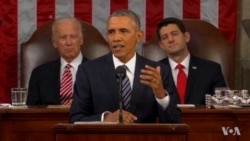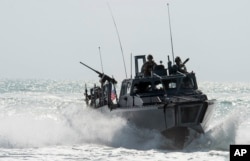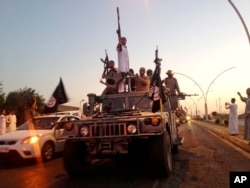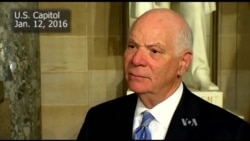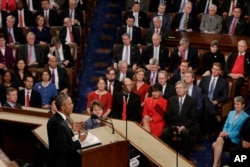President Barack Obama ended his State of the Union address Tuesday night with the customary assessment that the nation is strong and used a portion of his speech to portray America's standing in the world as stronger than ever.
"The United States of America is the most powerful nation on Earth. Period. It's not even close," Obama said.
He highlighted the U.S.-led coalition airstrikes against Islamic State targets in Syria and Iraq, the role the U.S. played in getting the international deal on Iran's nuclear program, the U.S. military operations that killed al-Qaida leaders and the U.S. efforts to help stop the spread of Ebola.
"Surveys show our standing around the world is higher than when I was elected to this office, and when it comes to every important international issue, people of the world do not look to Beijing or Moscow to lead. They call us."
But critics of the president's strategies, particularly in the Middle East where he has resisted calls to send in combat troops to battle Islamic State and instead relied on local and international partnerships, have said that under Obama the U.S. has reduced its role on the global stage.
Misunderstanding threats
Michael Pregent, a former intelligence adviser to General David Petraeus and the executive director of Veterans Against the Deal, said that when it came to foreign policy, the president's address was "detached from reality."
"People don't call the U.S. anymore. They actually do call Beijing, they actually do call Russia," Pregent said. "He doesn't seem to understand that this U.S. disengagement policy in the Middle East has actually resulted in prolonging wars and expanding them if you look at Iraq [and] Syria."
Obama stood before a joint session of Congress hours after 10 U.S. Navy crew members were detained by Iran. The Americans were expected to be released early Wednesday, but Pregent said Iran should have immediately released them and that Obama missed the chance to address the situation.
"I think this is one of the first State of the Unions where our president had an ongoing crisis that he failed to mention in the State of the Union to make Americans feel comfortable that their commander in chief was actually doing something about it," he said.
Republican presidential candidates Ted Cruz and Ben Carson joined the criticism of the president for not including the situation in his speech.
Pregent also said Obama downplayed the threat posed by Islamic State, recalling the president's earlier description of the militants as the "JV team" and saying he referred to them that way again Tuesday without using the phrase.
'Shouldn't overreact'
Lorenzo Vidino, director of the Program on Extremism at George Washington University's Center for Cyber and Homeland Security, said Obama's characterization of Islamic State made clear that he understands the threat without overexaggerating it.
"That we shouldn't overreact, that also means internationally, not necessarily going in actions that waste American lives and treasure, but also domestically, not an overreaction with some of the rhetoric and some of the divisive and racist rhetoric that we have seen in some quarters," Vidino said.
He also downplayed the significance of not mentioning the U.S. Navy personnel in Iran, citing the optimism from administration officials about the situation being potentially being resolved quickly.
"Now we'll see if that's really going to be the case, but it could really just be a minor incident, so not necessarily raising to the level of something that should be addressed in the State of the Union."
Obama is entering the final year of his presidency that began in 2009 and has featured some landmark policy initiatives popular with his Democratic Party and sharply opposed by Republicans.
U.S. Lawmakers React to Obama's State of The Union Speech:
Matt Gammon of Wilson Perkins Allen Opinion Research said Obama at this point is not as popular as other two-term presidents, making it hard for him to come out and take credit for things like his healthcare legislation that caused bipartisan division.
"One of the things that I really would have wished to hear more of is him reaching out to Republicans," Gammon said. "It's very easy to talk bipartisan game, you know he wants more money for Medicare, he wants more money for Social Security, he wants free college tuition, but I didn't hear him put a lot on the plate for Republicans. And I didn't hear him reach out to Republicans much on issues that they want from him."
Optimism
Obama's campaign for president in 2008 featured slogans like "Change we can believe in" that signaled a positive and inclusive bid to unite the country. His speech Tuesday at times harkened back to those ideas.
"That's the America I know," he said in his closing paragraph. "That's the country we love. Clear-eyed. Big-hearted. Undaunted by challenge. Optimistic that unarmed truth and unconditional love will have the final word."
Elizabeth Sena, vice president of Greenberg Quinlan Rosner Research, said the president was trying to "set the stage for the future" and his vision for the country.
"One of the things we saw with Obama in 2007, 2008 -- his slogan of "Yes we can" -- he was optimistic then. He wanted a brighter future, a new vision, and I think we saw him end on that note," Sena said. "I think he's still optimistic at heart and really believes that America can be better and that we can continue to grow as a nation."
Elizabeth Cherneff in contributed to this story





